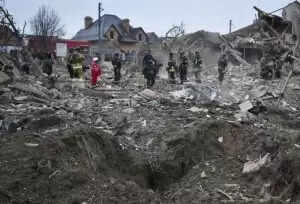 Diplomatic Efforts Intensify in London
Diplomatic Efforts Intensify in London

In London, representatives from the UK, US, European nations, and Ukraine are set to convene on Wednesday to advocate for a peace agreement between Moscow and Kyiv.
British Defense Secretary John Healey noted that this meeting follows discussions held in Paris last week, focusing on potential ceasefire terms and long-term peace strategies.
However, plans to include foreign ministers in the discussions were abruptly canceled after US Secretary of State Marco Rubio was unable to attend due to scheduling conflicts.
UK Foreign Secretary David Lammy announced on social media that the meeting would now consist of officials, including retired Lt Gen Keith Kellogg, who served as President Donald Trump’s envoy for Ukraine and Russia.
Speculation is rising that the US may urge Ukraine to relinquish some territory to Russia as part of a peace settlement.
During the previous Paris talks, US officials proposed allowing Russia to maintain control over certain occupied Ukrainian regions, according to a European source familiar with the discussions.
Ukrainian President Volodymyr Zelenskyy firmly rejected this notion, asserting, “There is nothing to discuss — it is our land, the land of the Ukrainian people.”
Some European allies express caution regarding the American proposal, yet there is recognition that Russia currently holds significant territory in five Ukrainian regions: Crimea, Luhansk, Donetsk, Zaporizhzhia, and Kherson.
A senior French official stated that if an immediate ceasefire is the goal, it should reflect the current lines of contact, speaking on the condition of anonymity.
Despite these challenges, maintaining Ukraine's territorial integrity and fostering closer ties with Europe remain top priorities for European leaders.
The outcome of these latest diplomatic initiatives remains uncertain, especially after more than three years of conflict following Russia's full-scale invasion.
While the UK has tempered expectations for a major breakthrough, officials emphasize that this week is crucial for diplomatic efforts aimed at ending the prolonged fighting.
Trump remarked last week that negotiations are reaching a critical point, suggesting the US might withdraw if neither side shows willingness to pursue peace.
Rubio has also hinted that the US may soon step back from negotiations if progress is not made, indicating that Wednesday's meeting could be pivotal for the Trump administration's continued involvement.
Yuri Ushakov, an adviser to Putin, mentioned that US special envoy Steve Witkoff is expected to visit Moscow again this week, though no further details were provided.
Analysts suggest that Moscow is not in a hurry to finalize peace talks, as it currently enjoys battlefield advantages and aims to expand its territorial gains.
Dave Pares, spokesperson for Prime Minister Keir Starmer, stated, “The ball’s in Russia’s court,” urging President Putin to demonstrate a genuine commitment to peace.
Zelenskyy confirmed that Ukraine's delegation to the UK is authorized to discuss only an unconditional or partial ceasefire with Russia, stating, “After a ceasefire, we’re ready to engage in talks in any format.”
Kremlin spokesman Dmitry Peskov warned that the complexities of the settlement issue make it impractical to impose strict timelines for a viable resolution.
Delegations from both Russia and Ukraine have engaged in separate discussions with US officials in Saudi Arabia, as Trump seeks to fulfill his campaign promise to end the conflict.
Russia has effectively dismissed a US proposal for an immediate 30-day ceasefire, citing extensive conditions.
Putin announced a unilateral 30-hour ceasefire on Saturday, but Ukrainian and British officials reported that Russian attacks persisted during this supposed pause. Verification of the ceasefire along the extensive front line remains unconfirmed.
As both Russia and Ukraine prepare for the upcoming spring-summer military campaign, officials from Ukraine and the West are closely monitoring the situation.